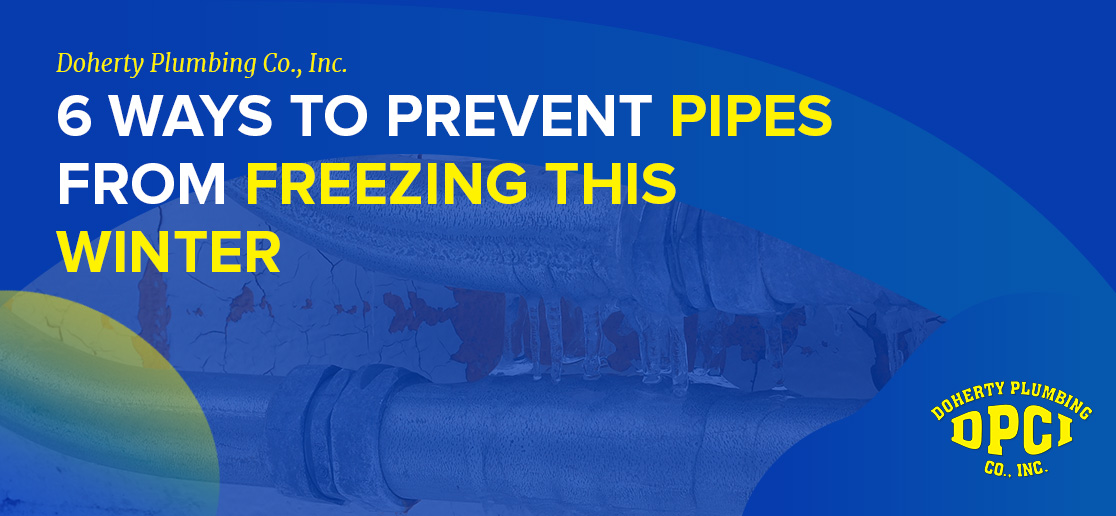
6 Ways to Prevent Pipes from Freezing This Winter
Burst pipes are one of the biggest plumbing emergencies you can face, and it’s even worse during winter when you rely on hot water to stay nice and warm. Pipes freeze in a house when the temperature outside hits around 20 degrees Fahrenheit; in Virginia, winters are usually between 30 to 50 degrees, but they can plummet below 20 and even hit 0 in extreme cases. If your internal water line drops below 32 degrees, your pipes are still at risk of bursting or freezing. This means you have to take proactive steps to ensure your plumbing is protected all season long.
To give you a head start on winterizing your home’s plumbing, here are six handy ways to prevent pipes from freezing this winter. If you’re ever in need of assistance or repair, we are your go-to plumbing company Arlington area.
Keep Your Home Warm

Even heating throughout the home is an important factor in preventing heating. Switch ceiling fans to rotate counter-clockwise so they push hot air down instead of drawing it up; you should also keep interior doors and vents open to ensure heat circulates well throughout every room.
If you have a garage, make sure you take added measures to keep it warm. If the water line is located in your garage and it gets too cold, you could have the entire home’s plumbing freeze and pipes burst.
Weatherstripping your home is also an easy and affordable way to boost your insulation; weatherstripping kits are simple to DIY, and they allow you to stop any cold air from seeping into the interior. Another bonus is that sealed cracks and secure door and window frames also deter any winter pests from taking up residence with you this winter!
Open the Kitchen Cabinets
You can ensure pipes under the sink get some much-needed heat by opening the cabinets when you’re not home. One thing to avoid is leaving them open when children or pets can access cleaning products or anything else harmful to them; if you won’t be home, then it’s perfectly acceptable to leave them open while you’re away, especially if you’re going on vacation.
The goal should be to create as much even air distribution as possible. Closing off any rooms or areas puts pipes at a greater risk of freezing over.
Run the Faucets

You can let lukewarm water drip from your faucets for a few hours a day to ensure they stay warm. If you notice any poor flow, this is the first warning sign that your pipes are too cold. You can also insulate your pipes with foam or even a sliced pool noodle to keep them extra warm this winter; bear in mind that running your faucets, even on drip, can lead to higher water bills.
Avoid an endless drip all season but do turn them on several times a day. Leaving them to slightly drip lukewarm water at night can help keep them warm as the temperature drops. Frequently turning on the faucets also helps relieve pressure, which can prevent sudden bursts.
Drain Your Hose Spigot and Insulate Irrigation Pipes
So many homeowners focus so much on the interior plumbing that they forget to protect the pipes outdoors. If you have a hose or sprinkler system, turn off the water supply from inside your house, then drain the outside pipe completely to ensure there’s no excess water in the line.
The best way to prevent your sprinkler system from breaking down this winter is to insulate the outdoor backflow preventer. This is an above-ground pipe that sticks out of the ground; water that gets trapped underground will cause the pipes to swell and burst when the water thaws. Luckily, it’s easy to prevent this from happening. You have a few options available:
- Buy a backflow insulation bag to place over the pipe.
- Use an old pillow, tape, and a plastic bag to cover the pipe and keep it warm.
- Wrap a couple of old towels around the pipe, tape them in place and cover with a plastic bag.
If you are unsure how to turn off your irrigation system or drain your sprinkler water line, we can help.
Keep the Thermostat on When You’re Away

Even if you leave the house for a prolonged period, plan ahead for the heating costs as you’ll need to leave the thermostat set to at least 60 degrees. A friend or family member can adjust it for you, or you can install a smart thermostat that automatically regulates the temperature in your home.
If you plan on leaving for a prolonged period, and your house will be unheated, then shut off the main water line completely before you go. When you return, allow the house to warm thoroughly before you turn the water back on. This will ensure that the pipes are able to handle the flow and not freeze any water as soon as it enters them.
Install a Freeze-proof Sillcock
Sillcocks are water faucets you install outside of the house to regulate the flow of water in the main line. Freeze-proof sillcocks, also called frost-free and frost-proof sillcocks, ensures that water freely exits your pipes during the winter. This prevents the build-up that causes water to freeze and expand in the plumbing, which causes bursts and flooding.
A freeze-proof sillcock is easy to install, but if you aren’t familiar with plumbing or home DIY, you may need a professional hand. In that case, we’re happy to help you choose the right sillcock for your plumbing and install it for you.
Winterize Your Home with a Pro
We can help you winterize your entire home’s plumbing system through high-quality insulation and pipe-draining. We can also give you more helpful tips and tricks to protect your plumbing throughout the season.
If you ever run into an emergency, such as frozen or burst pipes, we’re only a phone call away. Contact us whenever you need help this winter, and we’ll dispatch one of our skilled technicians in a flash.
